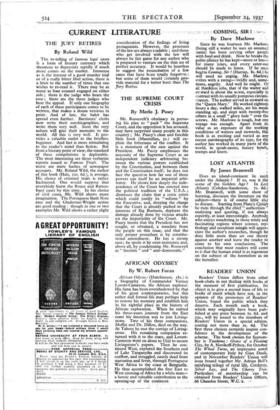Ct.JRRENT LITERATURE
THE JURY RETIRES By Roland Wild
The re-telling of famous legal cases is a form of literary currency which threatens to depreciate rapidly if much more comes on the market. Immense as is the interest of a good murder trial or of a really bitter libel action, there is a limit to the number of times that one wishes to re-read it. There may be as many as for counsel engaged on either side ; there is the judge who hears the -case ; there are the three judges who hear the appeal. If only one biography of each of these participants comes to be written, that makes a dozen versions in print. And of late, the habit has spread even further. Barristers' clerks now write their autobiographies, and write them very well. Soon the very ushers will give - their memoirs to the world. All this is very well. It pro- vides a valuable outlet to the briefless beginner. And fact is more stimulating to the reader's mind than fiction. But from a literary point of view, the standard Of these compilations is deplorable. The most interesting are those verbatim reports issued as Famous Trials. The worst are mere hashes of newspaper accounts. Mr. Roland Wild, the author of this book (Hale, tas. 6d.), is average. His choice of criminal trials is rather hackneyed. One would suppose that everybody knew the Rouse and Ratten- bury cases by this time. In his choice of civil cases, Mr. Wild shows more imagination. The Portuguese Bank Note Case and the Gladstone-Wright action are good reading : though in one or two examples Mr. Wild shows a rather slight consideration of the feelings of living protagonists. However, the processes of the law are always readable ; and those who get involved with the law will always be fair game for any author who is prepared to venture on the thin ice of perfect accuracy. It would be heartless to suggest the resuscitation of a few cases that have been totally forgotten : but some of them would certainly pro- vide material for a better book than The jury Retires.


















































 Previous page
Previous page